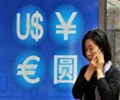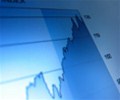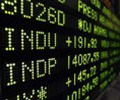
Euro touched the peak of four months against the US dollar on Thursday after the European Central Bank cut interest rates for the sixth time in nine months, as expected, but revised the estimated short -term inflation.
A single European currency rose 0.5% to $ 1,0848, after previously reaching the highest four months $ 1,0854. Euro has risen 4.5% so far this week, set for its biggest weekly jump since May 2009.
Germany increased expenditure, with a special fund of 500 billion euros ($ 540.90 billion) sought by infrastructure and plans to increase defense investment that has long been emphasized by rigid loan rules. Large government expenditure, which can support overall growth, can also worsen price pressure.
The size of the long -term inflation in the Euro zone has jumped from about 2.05% earlier this week to 2.24% on Thursday, an extraordinary large change. The ECB has increased its inflation estimate to 2.3% this year, above 2.1% which was seen three months ago.
The dollar, on the other hand, continued to fight on Thursday, when the United States under Trump’s government continued to advance with the planned tariff that had led to a prolonged global trade war concern that could have a severe impact on economic growth and inflation.
For now, his attention is in Europe in the midst of Bund sales that witnessed the 10 -year benchmark results on Wednesday posted its biggest daily increase in more than 25 years.
“ECB tends to be quite careful in stepping on a new foundation like that and higher interest rates can apply as a result,” said Lindsay James, an investment strategy expert, at Quilter in London.
President Trump gave a suspension of a one -month sentence on an automatic levy to Canada and Mexico.
The big focus for investors is the expected impact of the German large expenditure plan on the ECB monetary policy. ECB President Christine Lagarde, in a press conference, said the expenditure proposal would increase European growth.
But he noted that the ECB must be “attentive, alert” and understand how it works. “What is the time, what financing later so that we can then draw conclusions and appreciate how much it will contribute to growth and what its impact will eventually be on inflation,” he said.
Across the Atlantic, the dollar index, which measured Greenback against six colleagues, was in four days in a row on Thursday, falling to the lowest level of four months. That last fell 0.4% at 103.88.
Trump’s administration, which has slapped tariffs in Canada, Mexico and China, gave a suspension of one month sentence to car import levies to its closest neighbors, once again showing how fast the trade landscape could shift.
“It is clear that in the case of a US deepening, ongoing good news from Europe and a noisy US tariff policy can add fuel to fire,” wrote the Barclays analyst in the research record.
Greenback fell 0.5% against Canadian dollars to C $ 1,4272.
Canadian Prime Minister Justin Trudeau said on Thursday that Canada would continue to be in a trade war with the United States for the future. He will continue to be involved with Trump’s senior administrative officials about tariffs on all Canadian imports, he said.
Currency offer price on March 6 03:41 PM GMT
Source: Reuters (reporting by Gerrtrude Chavez-Dreyfuss in New York and Yadarisa Shabong in Bengalaru; Additional Reporting by Kevin Buckland in Tokyo; Editing by Jacqueline Wong, Sonali Paul, Alex Richardson, William Maclean)




